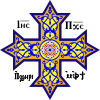Ananiel
Ananiel, Anânêl (Aramaic: עננאל, Greek: Ανανιας) was the 14th Watcher of the 20 leaders of the 200 fallen angels who are mentioned in an ancient work titled the Book of Enoch. The name Ananiel is sometimes translated as "Rain of God" even though the name is often confused with the name Hananiel. Michael Knibb[1] interprets his name to be "cloud of God". The name came into Arabic from the Coptics who in turn transliterated it from the Greeks.[2]
Ananiel was entrusted by God "all the trees of the earth, its plants, the rain, the dew, the heat, the simoom, the wind and as many [atmospheric phenomena] as there are in summer and winter."[3]
Ananiel is also known as an angelic guard of the gates of the South Wind.[4] The Book of Enoch describes three gates for each direction. The first gate inclines to the south-east and brings a hot wind. The second is due south and brings pleasant fragrances, dew, rain, prosperity and life. The third is south-west and brings dew, rain, locusts and devastation.[5] Ananiel is one of the guardians of these gates and can be interpreted as an Archangel to petition for these.
Conversely, according to the tradition of the Coptic Orthodox Church, Ananiel is the name of one of the seven holy archangels.[6]
See also[edit]
References[edit]
- ^ Knibb, Michael A., The Ethiopic Book Of Enoch, Oxford: Clarendon Press, 1978, repr. 1982.
- ^ Peinado, Miguel A. G. and Membrives, Eva M., Aspects of Literary Translation: Building Linguistic and Cultural Bridge in Past and Present, Germany: Gunter Narr Verlag, 2012.
- ^ Peinado, Miguel A. G. and Membrives, Eva M., Aspects of Literary Translation: Building Linguistic and Cultural Bridge in Past and Present, Germany: Narr Francke Attempto Veriag GmbH + Co. KG, 2012.
- ^ Davidson, Gustav, A Dictionary of Angels, New York: The Free Press, 1971.
- ^ The Book of Enoch, IAP, 2009
- ^ Meinardus, Otto F. A. (3 July 2015). "The Heavenly Host in the Coptic Tradition". becomeorthodox.org. Archived from the original on 29 June 2019. Retrieved 19 April 2019.
Further reading[edit]
- Davidson, Gustav (1967). A Dictionary of Angels. The Free Press ISBN 978-0029070529
- Membrives & Peinado (2012). Aspects of Literary Translation: Building Linguistic and Cultural Bridge in Past and Present. Germany: Gunter Narr Verlag ISBN 978-3823367086
- Knibb, Michael (1979). The Ethiopic Book Of Enoch. Oxford: Clarendon Press. ISBN 978-0198261636
- (2009). The Book of Enoch. IAP. ISBN 978-8562022456

